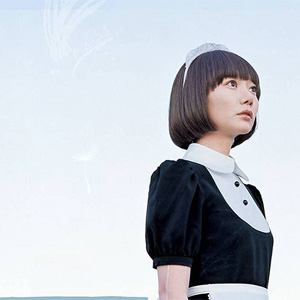
Love Will Tear Us Apart: Air Doll (2009)
Cast: Doona Bae, Arata, Itsuji Itao
Director: Hirokazu Koreeda
Country: Japan
Genre: Drama | Fantasy
Official Trailer: Here
Editor’s Notes: The following review of Air Doll is a part of Rowena’s coverage of the 6th Annual Globus Film Series at the Japan Society in New York, Love Will Tear Us Apart.
Kicking off Saturday’s schedule of films is Koreeda Hirokazu’s turn to an adaptation of Goda Yoshie’s manga about a blow-up sex doll coming to life and realising that she has a heart. This turn may have surprised the film world, given Koreeda’s established context of the family unit, memory, mourning, and separation. But it was a delightful-and dare one say necessary-surprise. To approach such a narrative, Koreeda does not compromise his aesthetic of meditative pace, his preference for the details of gestures and things in silence, or themes of transition. In fact, he takes this narrative as a challenge to address some of his more frequent preoccupations of the fragility of human contact and the anonymity and disconnection of big city life. And what could be more fragile and anonymous than a blow-up sex doll, which must rely on others in order to have a semblance of a human body and yet must always ultimately fail to become human even with a heart? The audiovisual and philosophical beauty of this film stems from Koreeda’s ability to construct a world seen through the rather skewed lens of a sex substitute, with sensitivity and dashes of humour that resonate with everyday life.
…it was a delightful-and dare one say necessary-surprise. To approach such a narrative, Koreeda does not compromise his aesthetic of meditative pace, his preference for the details of gestures and things in silence, or themes of transition. In fact, he takes this narrative as a challenge to address some of his more frequent preoccupations of the fragility of human contact and the anonymity and disconnection of big city life.
 But crucial to the construction and wistful charm and surreality of this world is actress Bae Doo-na as Nozomi the doll. (Do not buy into the discourse that reads Bae as the Korean actress subjected to being a fetish in a Japanese film, which denies her talent as an actress and reduces the film to a peep-show.) Her ability to inject meaning and wonderment with the turn of her head, her eyes, or her hand; her firm understanding of the role at the level of the body in sync with Koreeda’s direction, are absolutely impeccable. By remaining faithful to the physical limitations of a doll that comes to life-for example, the way she walks, the way her skin looks-from Koreeda’s perspective as the writer/director and Bae’s perspective as the performer, Nozomi forces one to rethink the space of everyday life. By extension, Nozomi forces one to think how one moves around and engages with this everyday. With a camera that is constantly and subtly moving, in relation to the characters and their own movements vis-à-vis things and other people; Bae’s controlled modulation of her own movements as Nozomi; and famed cinematographer Mark Lee Ping-bing’s ethereal, gossamer-like photography, the film is no less than an understated look at human movement and the varied meanings or misunderstandings that they develop, at times even against one’s intentions. When Nozomi encounters what could be called love with her co-worker Junichi (Arata) at the rental video/DVD store, the consequences are marvelous at first but then become quietly horrific, based precisely on an unintentional misunderstanding on each other’s quality of being. But between the marvelous and the horrific, Bae and Arata come to constitute one of the all-time cinephilic couples in cinema.
But crucial to the construction and wistful charm and surreality of this world is actress Bae Doo-na as Nozomi the doll. (Do not buy into the discourse that reads Bae as the Korean actress subjected to being a fetish in a Japanese film, which denies her talent as an actress and reduces the film to a peep-show.) Her ability to inject meaning and wonderment with the turn of her head, her eyes, or her hand; her firm understanding of the role at the level of the body in sync with Koreeda’s direction, are absolutely impeccable. By remaining faithful to the physical limitations of a doll that comes to life-for example, the way she walks, the way her skin looks-from Koreeda’s perspective as the writer/director and Bae’s perspective as the performer, Nozomi forces one to rethink the space of everyday life. By extension, Nozomi forces one to think how one moves around and engages with this everyday. With a camera that is constantly and subtly moving, in relation to the characters and their own movements vis-à-vis things and other people; Bae’s controlled modulation of her own movements as Nozomi; and famed cinematographer Mark Lee Ping-bing’s ethereal, gossamer-like photography, the film is no less than an understated look at human movement and the varied meanings or misunderstandings that they develop, at times even against one’s intentions. When Nozomi encounters what could be called love with her co-worker Junichi (Arata) at the rental video/DVD store, the consequences are marvelous at first but then become quietly horrific, based precisely on an unintentional misunderstanding on each other’s quality of being. But between the marvelous and the horrific, Bae and Arata come to constitute one of the all-time cinephilic couples in cinema.
Related Posts
Rowena Santos Aquino
Latest posts by Rowena Santos Aquino (see all)
































